Photographs: Jason Reed /Reuters
Tracking of consumers has helped shape many moves of Shoppers Stop - from merchandising and increasing the ticket size of purchases to opening of new stores.
The slowdown that came fast and furious in 2008 drove home the virtues of thrift to the country's retailers. Most renegotiated rents, squeezed the last paisa out of the vendor, shut down stores that were no longer viable and pruned the workforce. There was also a rush for private labels - though cheaper than brands, they offer better profit margins to the retailers.
There was also some rethink on the merchandise: Why not write more affordable prices?
...
Once again, consumers lead the way
Photographs: Company website
The exuberance was gone and there was a general tendency to slow the pace and move down the value chain.
In contrast, Shoppers Stop, the Raheja-owned chain of departmental stores, decided it would be brand-led and re-branded itself as a premium-to-luxury retailer.
When others retracted their expansion plans, Shoppers Stop opened shop beyond the top-tier cities. What made it take the contrarian strategy was its base of repeat customers and the loyalty cards they held.
Tracking this band of consumers has shaped the retailer's many moves - merchandising, increasing the ticket size of purchases, new store openings et al.
...
Once again, consumers lead the way
Photographs: Issei Kato/Reuters
For the record, Shoppers Stop came out of the red in 2009-10. From a loss of Rs 63.65 crore in 2008-09 on net sale of Rs 1,438.3 crore, it turned to a profit of Rs 35.88 crore on net sale of Rs 1,611.83 crore.
Shoppers Stop Vice-president (marketing and loyalty) Vinay Bhatia says there are 1.8 million loyalty cardholders who account for 73 per cent of the total sale.
The First Citizen card, like any other loyalty programme, logs all the purchases made by the customer; points are assigned to the money spent, which can be redeemed by the customer.
"We get information of every purchase of every such customer right from the first day," says Bhatia. Ernst & Young Partner (retail and consumer products) Pinakiranjan Mishra says, "More than the number of loyal members, what matters is how the retailer manages the data."
...
Once again, consumers lead the way
Photographs: Pawan Kumar/Reuters
To rein in the juggernaut of such information (16.5 million product units of every year), Shoppers Stop has put in place a four-member analytics team to monetise the insights they read from the transactions.
"We don't see the information logged as an aggregation of cash memos but as vital clues to the purchase behaviour from our stores," says Bhatia. What we don't know is the purchase from other stores which we ascertain through our wardrobe studies for new stores," says Bhatia.
The company has also invested in technology to log such transactions on its other platforms as well: Homestop (furnishing and kitchenware), Crossword (books and music) and Hypercity (hypermarket); however, the Shoppers Stop scheme remains the largest.
...
Once again, consumers lead the way
Photographs: Reuters
"It is more effective than sample-based market research which would never have given us insights on actual purchases," notes Bhatia.
The usual analysis around festivals and communities is one part of it, something that Future Group has mastered well. More comes into play during opening new store or for targeted communication.
Shoppers Stop does not depend on sample-based market research alone when opening a new store.
It is aware that shoppers outside its catchment areas travel to its stores to shop. Its First Citizen base, which puts data down against pin codes, tells it that people from Amritsar would shop in Delhi, Aurangabad in Pune or Mumbai and even people in Vashi in Navi Mumbai in its Chembur and Mulund stores - areas it has recently opened outlets in.
...
Once again, consumers lead the way
Image: Shoppers Stop Managing Director Govind ShrikhandePhotographs: Company website
Shoppers Stop Managing Director Govind Shrikhande says: "We already have consumers in our database from places near major cities where we intend to open stores. In Amritsar and its nearby towns, for example, we had 2,000 existing members."
From premium to luxury
Thus, when it opened in Vashi in 2009, Shoppers Stop knew what to provision for. With cardholders from Vashi already on its radar, it analysed their purchases to find a skew towards accessories.
"People who would come down from Vashi to other stores in Mumbai would opt for accessories such as bags and shoes rather than shop for apparels to change their looks," says Bhatia.
...
Once again, consumers lead the way
The beauty and accessory section, right at the entry, was therefore bigger compared to the other stores. Similarly, women from Amritsar shopped more for ethnic wear and men for casuals (the absence of a corporate environment and of more business), helping the retailer stock accordingly; makeup was a big draw too with more time at their disposal for even small outings. Shoppers Stop launched its full-fledged make-up brands including the top-end MAC in the Amritsar store.
"A large population of non-resident Indians means the shoppers know their way around premium and luxury brands," says Bhatia.
When a new store opens, analysis of the data lets the retailer calculate the extent to which the revenue of its existing stores will get hit.
...
Once again, consumers lead the way
Photographs: Sima Dubey/Reuters
"With the Vashi store, we knew that there would be a dip of 4 to 5 per cent in sale in the other stores. We don't have to wait for the new store to open to gauge the cannibalisation for the last seven or eight launches that we have done. We brace for it in advance," adds Bhatia.
This is important. A large part of the retail business is to keep the supply chain as lean as possible; proper demand projection helps bring in great efficiencies into it.
It helps in another way: Once it knew that customers would shift to the new store, the retailer took some of its employees from the other two stores and posted them in Vashi since the traffic would have gone down.
...
Once again, consumers lead the way
"We did not have to depend only on fresh recruits for the new store; likewise, while we can't shrink the area of the stores, we rationalised the volumes of the different SKUs in these stores to account for the diverted traffic," says Bhatia.
Shoppers Stop also does third-party surveys such as wardrobe studies before opening in a new catchment area. Wardrobe studies help it ascertain the aspirations as well as the actual mix in a town's wardrobes.
Not just demographics, it also studies the financial profile of the town from the kind of bank brands there to the number of credit cards.
"A city with a high use of credit cards would mean an environment conducive to a departmental store," says Bhatia.
...
Once again, consumers lead the way
Photographs: Reuters
Number of vehicles, telecom penetration, the presence of educational institutions and even denim-wear consumption also help it fine tune a town's profile.
The type of vehicles help it negotiate with the mall developers for more space accordingly; if, for instance, there is greater dependence on two-wheelers then provisions for helmets and more space for two-wheelers are marked out.
"We keep the look of the stores the same everywhere; but in Bhopal, for example, we would not have too many full-length luxury cosmetic brands such as Dior or Clinique. We would start with Lakme, Maybelline and L'Oreal but still have Tommy Hilfiger to make that aspirational statement, "says Shrikhande.
...
Once again, consumers lead the way
One-stop shop
Still, Shoppers Stop has not reverted to the pre-downturn eagerness to open stores. It is concentrating only on anchor stores in contrast to the standalone format.
Bhatia says: "We have shortlisted 26 cities from the 45 in India with a population of over 1 million. We are already present in 15 of them and will enter 11 more in the next four years. In line with our positioning, we will cater to the top end of India. In the next four years, we will target 26 more stores."
There are 34 stores of Shoppers Stop. The First Citizen analytics has been fine-tuning its entry into new catchments such as Amritsar, Aurangabad and Bhopal over the past few months. Next up are Durgapur, Mysore and Vijayawada.
....
Once again, consumers lead the way
Photographs: Reuters
Early March last year, it had segmented its consumers under categories such as bridge to luxury (BTL, straddling luxury and above-premium brands), premium, popular (mass brands) and value (those who buy during a sale).
"Our BTL cardholders alone contribute to 91 per cent of the full BTL sale," says Bhatia. BTL brands account for 15 per cent of Shoppers Stop's revenue, up from 2 per cent in 2008, before the retailer repositioned itself.
How does this help? Instead of spending on wide-ranging communication, often called the shotgun approach, Shoppers Stop has used the segmentation for sharper advertisements with mailers and mobile-phone messages for its BTL loyalists when it launched Mustang, one of its exclusive brand tie-ups, last year.
"Relevant and discreet communication will make the consumer take our messages seriously," says Bhatia.
...
Once again, consumers lead the way
Photographs: Mike Segar/Reuters
Once in the store, it has lined up for the cardholders personal shoppers and an upgraded store experience.
Shoppers Stop has trained its eyes on increasing the ticket sizes that customers run up when encashing their loyalty points.
Regular reminders of the expiry of points in simplified rupee-value terms are sent. This festival season it let shoppers choose their own gift for high bill amounts rather than saddle them with trinkets and accessories that might not match their tastes.
Loyalty cardholders dropping off its maps are coaxed back with personalised offers if they haven't paid for with the card for the last 12 to 18 months.
...
Once again, consumers lead the way
"We charge shoppers a nominal fee of Rs 200 to enroll in our programme in the first place, hoping that their involvement in such a paid-for system would be deeper and they would carry the card every time they come in," Bhatia says.
The cross-referencing of purchase history of cardholders revealed an odd buying behaviour: Men would come in and buy shirts but would not pair these with trousers.
"We broke them into three types: Those who needed a benefit in such as an offer, for whom we said we will discount the second trouser they buy; the second was the one who bought shirts and even casual trousers but not formal trousers, and for them we introduced bundling shirts with trousers; the last was the one who wanted new brands to purchase, to whom we did not communicate discounts but appraised him of the new brands and fits that came in our stores," says Bhatia.
...
Once again, consumers lead the way
All of these measures are geared to send the average ticket size up north. Purchases among the 100,000 members who got such communication shot up by 30 per cent, compared to the control group whom Shoppers Stop did not send any to gauge the change.
Shoppers Stop also tied up with a jewellery brand in its stores and sent out mailers to 15,000 members who had shopped for jewellery but had not bought any in the last 18 months.
Bhatia claims there was an increase of 40 per cent in jewellery purchases among this group over the ones who had not received such communication.
...
Once again, consumers lead the way
Photographs: Reuters
Gaining an edge through loyalty cards over competition took on a different tone in 2008 when Future Group's brand-led format, Central, invited cardholders of other department stores such as Shoppers Stop and Lifestyle to avail of additional discounts at its Gurgaon outlet.
The campaign of course ran into legal proceedings but not before underlying the import of loyalty programmes for Indian retailers during and after the downturn. Shoppers Stop had the added burden of trying to keep its positioning as a more premium brand alive.
Shopper sentiments have since picked up, as have exclusive international brands on Shoppers Stop's floor such as Mustang, Mothercare, Guerlin cosmetics and Austin Reed.

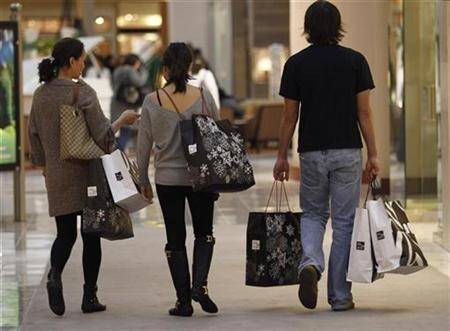
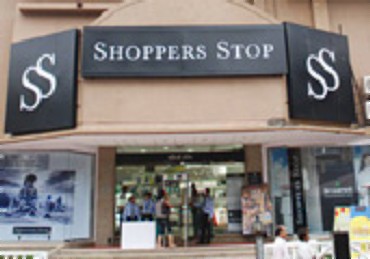

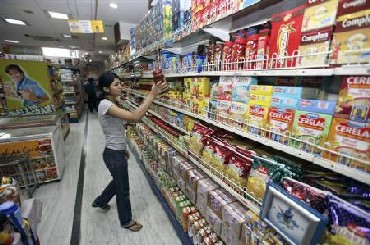
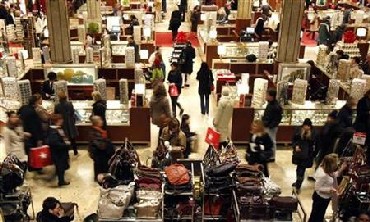
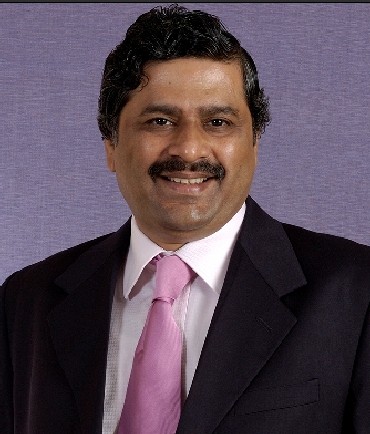
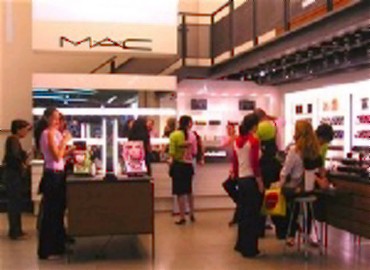
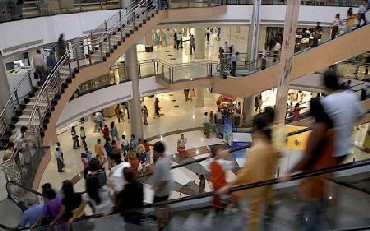

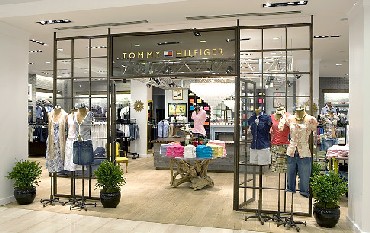
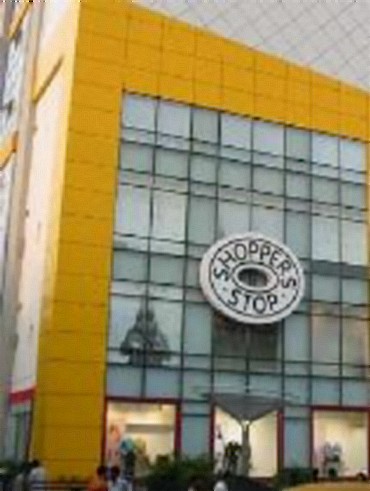
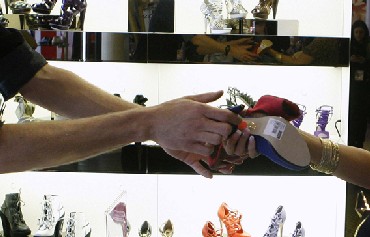
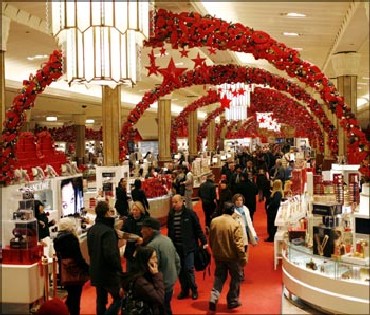
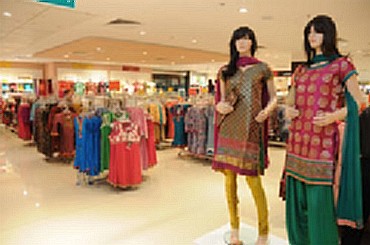
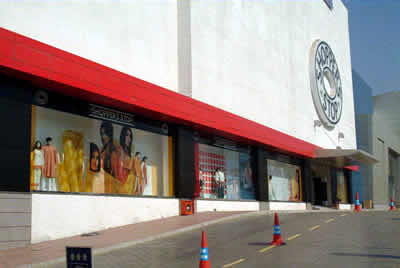


article